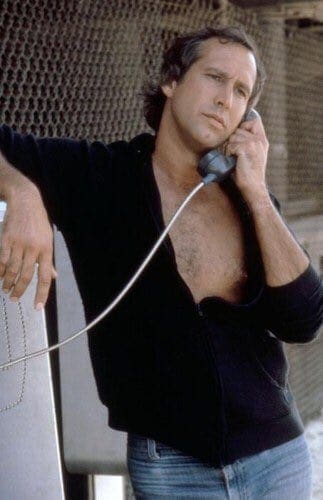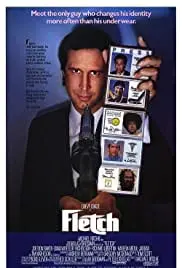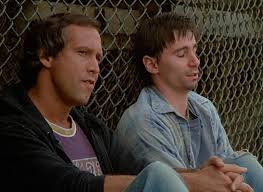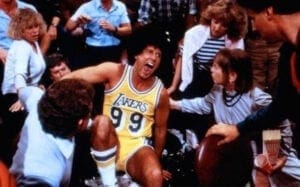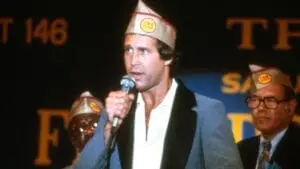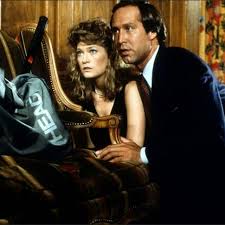An investigative reporter stumbles upon a big story when a wealthy aviation executive hires a hitman to kill him.
Why it’s rad:
Chevy Chase’s signature role and biggest hit, creating a generation who can quote the entire film.
QUOTEABLES:
”I’ll have a Bloody Mary, and a steak sandwich and…a steak sandwich.”
“It’s all ball bearings nowadays.”
"I'm Frieda's boss." "Who's Frieda?" "My secretary."
"Can I borrow your towel for a sec? My car just hit a water buffalo."
"Charge it to the Underhills."
So '80s:
Drugs. Venice Beach, the beach just south of Santa Monica beach, did become a hangout for addicts, or "junkies," in the 1970s.
The country club. As wealth grew in the 1980s, so did rich people flocking to country clubs. Outdoor activities were added to the private club experience in the 1980s, especially tennis. And, yes, you could just tell the server you were charging it to an account.
"Dynasty." Fletch makes some current pop culture references, like references to No-Doz, the Publisher's Clearing House and its spokesperson Ed McMahon, and the Stephen King horror movie about a killer dog "Cujo." As Gail and Fletch try to escape Alan and Chief Karlin, Fletch says, "We're going to catch the last 10 minutes of 'Dynasty.'" That was a popular nighttime soap opera about ridiculously wealthy families.
What’s your damage?
Fletch is a PG-rated comedy that is pretty clean-cut by '80s standards. By today's standards, though, it's got its cringe moments. While they're all minor incidents, society is influenced by these smaller implications that are worked into our daily conversations. The dialogue in Fletch, much of which is improvised by Chevy Chase, reflects the way people spoke in 1985. But, Fletch in particular is one of the most oft-quoted movies by teens and young adults in the '80s - so those concepts were repeated over and over again, drilling down on the negative notions that took decades to topple -- and certainly haven't been completely overcome.
Fletch castigates police by implying they're gay. It starts when Fletch is brought into the police station and comments about the police chief being "a nice man," "Yeah, I heard he's mellowed out a lot since he came out of the closet" -- to which, the desk cop says, "you should get his photograph while he still has a face!" When the arresting officers are dismissed, Fletch chimes in, "Yeah, why don't you guys go to the gym and pump each other" -- and they shoot him a look of loathing. That's immediately followed up by the police chief asking, "Why are you doing this Mr. Fletch?" Fletch responds with sarcasm dripping from his voice: "I like men. I like being manhandled. I like you." All of this perpetuates the idea that being gay was being lesser, subhuman. It's the ultimate insult.
Fletch hits on Stanwyk's wife. Initially, Gail Stanwyk misconstrues Fletch's questions at the country club as come ons. However, he is legitimately trying to pump her for more than just information during their encounter in her country club cabana. "John Cocktosen" is quite "forward" -- which was the polite way to say a guy was making a woman uncomfortable with his advances:
- He asks Gail who answered the door after getting out of the shower, "Can I borrow your towel? I just hit a water buffalo," to which she gives a curt laugh.
- He makes the arrogant assumption she'll eat lunch with him in her cabana.
- He lays in her bed with the covers turned down while she gets dried off and dressed.
- In a later scene, he reveals to Gail that Alan is married to another woman and within a minute, takes advantage of the situation to makes an overture to Gail to sleep with him. She comments, "It's a really good time to make a pass at me." When Gail confronts Alan in front of Fletch, Fletch lets him know that he slept with Gail because if you want to show dominance over another man, you have sex with his wife - this is why soldiers "rape and pillage" when they attack.
- Michael Ritchie makes us feel better about all of this because Gail seems to laugh with Fletch at his come-ons. But, she establishes in her first scene that Alan's friends hit on her all the time. Women who are in this situation learn that "laughing it off" is the easiest way to not offend someone you're not sure if you can offend. She also makes it clear she'd like him to stop. And, herein lies the problem with laughing it off...men don't get the message. And guys, mimicking Fletch...and similar performances like Bill Murray's Peter Venkman in Ghostbusters...received a message that this behavior was both acceptable and successful, creating a world in which women were constantly sardonically harassed.
Fletch stiffs his ex-wife on her alimony settlement because she's a slut. Fletch has a steady job and a court assessed the amount of alimony he'd pay based on his salary. He knows the settlement amount but he doesn't pay it regularly because, he says, his ex-wife sleeps around. His position was likely a source of relatability to divorced men in 1985, especially because the divorce rate had skyrocket in this era. Fletch was a cool, influential character with an aspirational personality; if he thought it was okay to skip out on alimony, male viewers would think it was okay to do the same.
A comment at the American Legion is a wee bit racist. While commandeering the dinner honoring Fred Dorfman (yes, X Dorfman's older brother from Animal House which starred Tim Matheson), Fletch tells the one black man on the dais, "You're not gonna sing, are you Sammy?" That refers to Sammy Davis, Jr. The joke is black people look alike. Ha ha.
Behind the Scenes
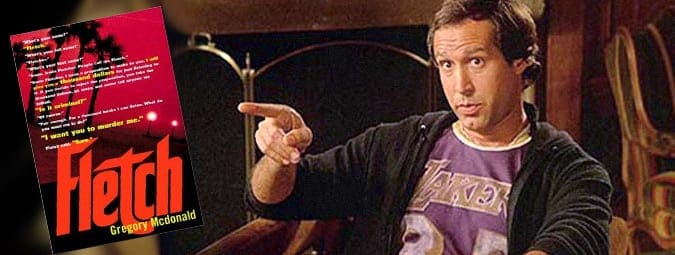
ORIGINS
Gregory Mcdonald was a Boston Globe reporter. His assignment: ”Go and have fun and write about it...and if you end up cut and bleeding on the sidewalk, call the office.”
Mcdonald quit his day job in 1973 to write the first novel, “Fletch.” Published in 1974, it was a bestseller and a winner of the Mystery Writers of America Edgar Award. He churned out 9 more Fletch-related novels over the next decade.
King-Hitzig Productions acquired the rights to "Fletch" immediately. Comedian Alan King's new production company got the greenlight from Columbia Pictures by the end of 1974. Author Mcdonald started adapting his novel into a screenplay. FIlming was set to start summer 1975.
Kirk Douglas' oldest son came on board as a producer. Peter Douglas was a second unit director at the time and fell in love with the novel when he read it in 1974. Wanting to make the movie himself, he came to find out the rights were with King who "didn't appear to be doing anything with it." He told mystery fiction journalist Lee Goldberg that King got bored of the project and sold the rights to Jonathan Burrows.
Jonathan Burrows was a former Broadway producer turned film exec. Burrows was training to be assistant to the president at Columbia Pictures. At the same time, he was a production executive at American Film Theater, a group that produced plays into movies for limited runs in a business model similar to Fathom Events today.
Burrows acquired the film rights to the novel, “Fletch.” Burrows had access to the project as an assistant to the top brass at Columbia. A 1976 Hollywood Reporter article indicates Burrows teamed up with Claude Berda of Paris-based Fred-Roy Productions to pay for the rights. The budget was now set at $1.7 million and was set to begin filming in Nov. 1976.
Burrows was in over his head but resented Douglas' overtures. Douglas said the producer was wet behind the ears. “He was a young kid totally out of his element trying very hard to get Fletch made,” Douglas told Goldberg. “I was in a position where I could offer him a deal to do it.” However, Burrows and Douglas "clashed" on some issues, so Burrows sold the film rights to another entity: a record label.
Enter Charisma Records. At the end of the 1970s, music labels were getting into the movie business as a strategy to promote their singles and acts. Charisma's most successful acts were Genesis, Peter Gabriel, and the Alan Parsons Project. The British label joined as a financier with big plans.
The budget was doubled and filming moved to Florida. In the summer of 1980, it was announced the budget had increased to $3.5 million and production was now set for the end of that year in The Sunshine State.
Mick Jagger as Irwin M. Fletcher. In one of the most controversial moves, Charisma had the idea that the Rolling Stones front man would play the wisecracking reporter -- and Jagger really wanted the role. Mcdonald, who retained final approval on casting, squashed the idea. David Bowie's name was then on the table. Douglas says the label head seemed to understand why his celebrity rock stars weren't appropriate for the project. However, the record label was now losing interest in making the film.
In the meantime, Peter Douglas was making a name for himself as a producer. The former AD opened Vincent Productions in 1978 and his first film, The Final Countdown, came out in 1980.
Douglas met with the William Morris agent who helped repackage the film. Stan Kamen represented director Michael Ritchie and Chevy Chase. They packaged the film and then brought the whole deal to Universal Pictures, who bought the film.
Blazing Saddles and The In-Laws screenwriter Andrew Bergman was brought on to write the screenplay. Bergman's inclusion is an example of how Universal went full throttle on the film. "Chevy was very hot. And the great thing was that Universal always thought Fletch was a hit movie, and they treated it like a hit, even when the first previews weren’t that good. They never got frightened. They just said this is a hit, they were selling it like a hit, and then it was a hit," he told EW in 2015. "That was a very fun project. I wrote it in like four weeks, and I can’t write a check in four weeks. It just adapted so easily."
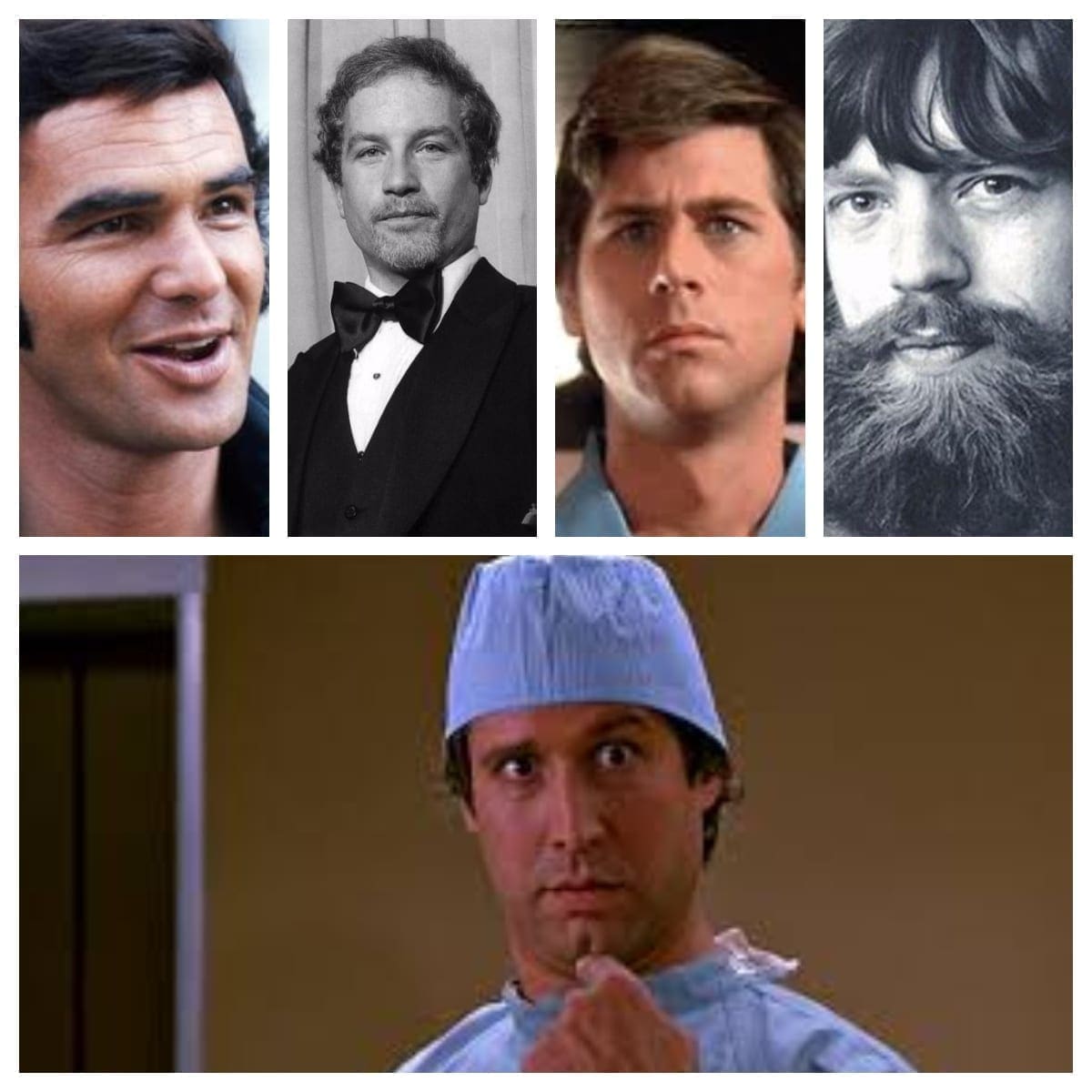
CASTING
Chevy Chase originally turned down the role. However, when reapproached, he stated he was unaware about the initial offer – his agent or manager never told him about it.
Alt Irwin M. Fletchers: After the offer to Chevy Chase was turned down, producers put offers out to George Segal and Richard Dreyfuss, both of whom refused the part. Other considerations included Burt Reynolds, Barry Bostwick, Charles Grodin, and Jeff Daniels.
Michael Douglas and Treat Williams were the names being considered in 1980. When Peter Douglas started dreaming about making Fletch, his A-list brother was at the top of the list.
The role of the wise-ass undercover investigative reporter was in demand, though. In 1985, Gregory Mcdonald said, ”It seemed that over the last 10 years, everybody in the world who acts and is a male between the ages of 17 and 76 tried to get the role. Even Mick Jagger.”
Gregory Mcdonald had finally casting approval. It was a no on The Rolling Stones front man. "I admire Mick Jagger, but he is not my idea of a young American male." The author also squashed Burt Reynolds.
David Bowie in disguise? As mentioned in the section above, when Charisma Records was unable to get Mick Jagger approved, they floated another one of their artists: David Bowie. Also a no-go.
Dana Wheeler-Nicholson was only 23. Playing a love interest who is married and committed to another man is no easy feat, but the young actress says she believes she got the part because she was able to make Chevy Chase laugh. In 2011, she told the Austin Chronicle, "I was just a kid...I don't remember what I said. I just remember the laughter."
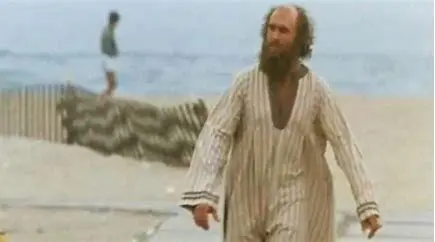
FILMING
Chevy Chase, a world class improviser, is given license by Ritchie to adlib. ”It all began when Tim Matheson asked me what my name was,” Chase said in an interview. ”Right away, with a straight face: ‘Ted Nugent.'"
One of Fletch's characters would be recognizable to '80s audiences. One of Chase’s disguises – the bearded guy on roller skates – is based on a real person. Ram Dass was a New Age spiritual leader of the era who’d written a popular book on mindfulness and consciousness expanding, “Be Here Now.”
Chevy Chase's diva reputation wasn't seen by his co-star. Whatever Chase's reputation, Dana Wheeler-Nicholson says she didn't see it. “I heard he was difficult and all the rumors,” she told Movie Geeks United. “ I found that not to be my experience. He couldn’t have been more loving and generous and protected me. It was my first big thing and he walked me through it. I have nothing but adoration for him.
Michael Ritchie directed the film, and Chevy Chase directed him. Ritchie was a well-established director with well-respected credits and hit films like Robert Redford's The Candidate, the beauty pageant comedy Smile, and of course, Bad News Bears. Still, Wheeler-Nicholson shared on the Movie Geeks United podcast that she saw Chase had the stronger hand. "From my very naive observation at the time, what Chevy wanted was what happened. He called the shots. Michael walked that line of being good to his star and leading man with a lot of money on the table from the studio -- Universal -- and getting a movie made that he wanted to make. He was a gentleman, he was very very sweet, and I think Chevy liked him very very much. I think there were times when Chevy overrode his directorial ideas out of knowing knew comedy better or thinking he knew comedy better, and there may have been a little bit of tension there. But, from my observation at the time, it was a very healthy collaboration, ultimately."
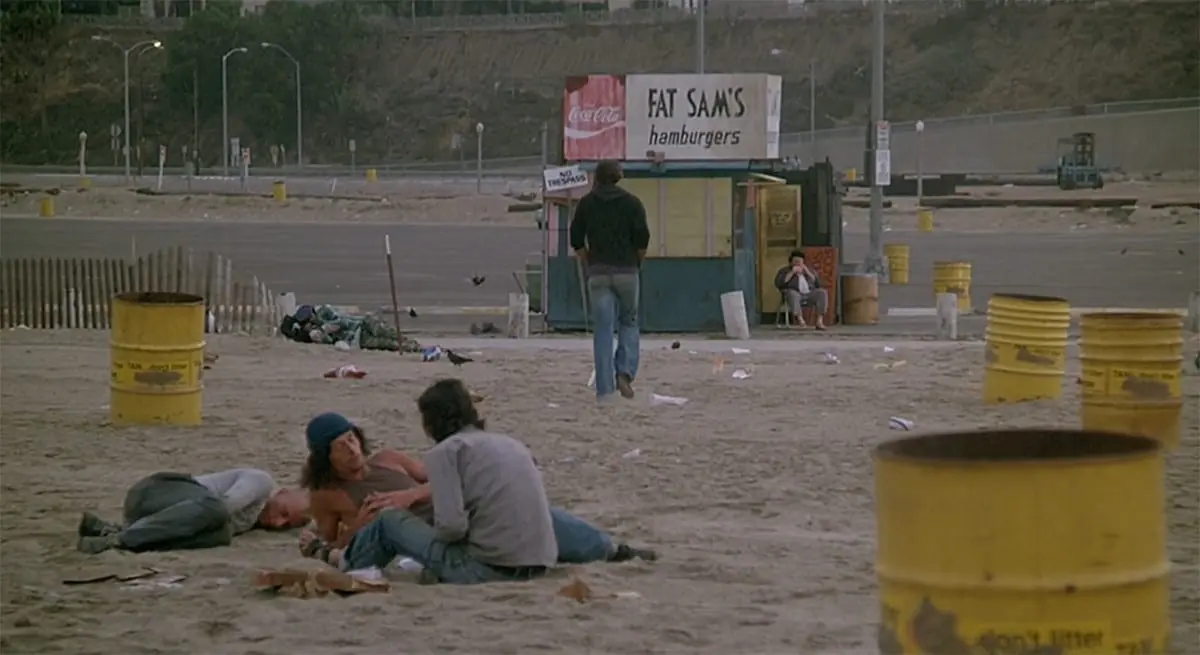
LOCATIONS
The 1984 Summer Olympics created a shooting nightmare. With the Olympics in Los Angeles, the locations need to stay clear of the areas where competitions may be held. Fletch mostly takes place in Santa Monica and the beach whereas most of the Olympics took place downtown and in Long Beach.
Drug activities took place at the Santa Monica Pier. Although, it seems impossible that the Pier area could be so empty as to house Fat Sal’s shack, the Pier was in a state of flux in 1984 (and would’ve been a decade earlier when Mcdonald wrote the novel). The pier was mostly abandoned and went through a series of fires in the mid ‘70s. Redevelopment had been underway but two giant storms in 1983 destroyed the Pier again, so Fletch’s reality wasn’t Hollywood magic...it was reality.
Fletch’s apartment is in Santa Monica. Irwin M. Fletcher may be strapped financially. But, his facade of a real apartment is located at 827 4th Street, near Montana Avenue.
Alan and Gail Stanwyck’s house is, of course, in Beverly Hills. Movie-locations.com lists the address at 1011 Beverly Drive. THe house is also seen as Whitney Houston’s estate in The Bodyguard and studio head Jack Woltz in The Godfather.
Provo isn’t Provo, it’s Ogden. Ogden, Utah, subs in all ways for Provo: the motel, the real estate company, the airport -- it’s all in Ogden. if you want to see Provo, you can see it in Footloose, even though that’s supposed to be Oklahoma.
DELETED SCENES
Tommy Lasorda cameo. Fletch was to go in disguise as a relief pitcher for the Los Angeles Dodgers.
One scene didn’t make the film, but it did make it onto the poster. Fletch was filmed in cognito as a hockey player. That scene was cut, but if you look carefully at his wallet full of ID’s, one shows him in full hockey gear.
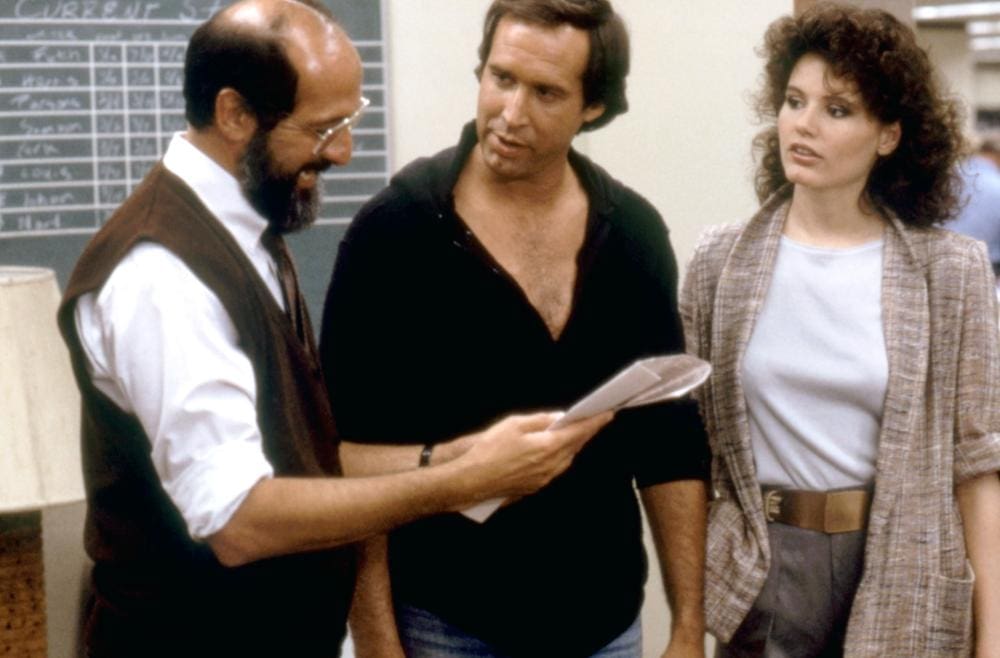
REVIEWS
Most critics called out Chevy Chase for playing the same character he plays all the time: himself. However, almost all critics raved about the work of director Michael Ritchie, editor Richard Harris, and the supporting cast.
Roger Ebert called it "a masterpiece in editing" but that Fletch "is an anthology of Chevy Chase mannerisms in search of a character." The Chicago Sun-Times critic wrote, "Other elements in the movie are pretty good: the supporting characters, the ingenious plot, the unexpected locations. But whenever the move threatens to work, there's Chevy Chase with his monotone, deadpan cynicism, distancing himself from the material.
The LA Times: “Good, not great.” “Fletch is smart, dead-pan dry and funny--most of the time, when it’s not being faintly superior."
Vincent Canby of The New York Times: "Colorful, amusing whodunit with exceptional cast."
The Hollywood Reporter: "One of the most amusing entertainments to come around in a while."
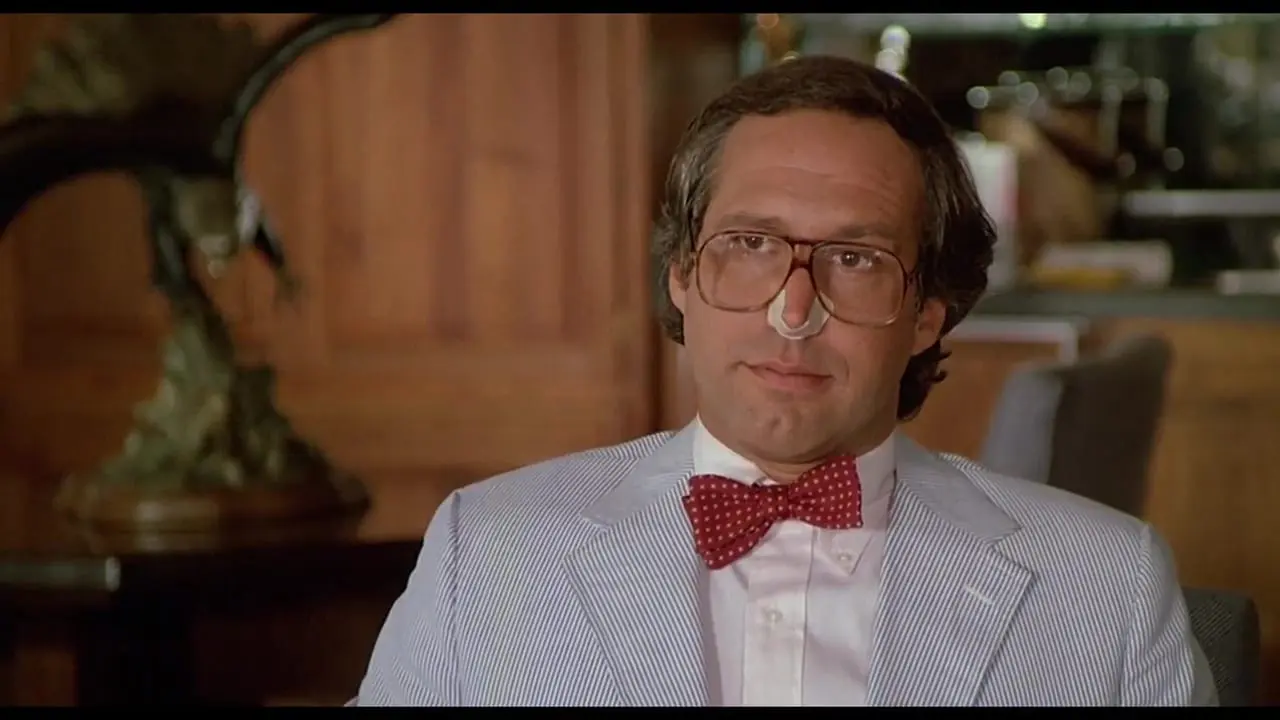
LEGACY
”I think Fletch’s particular wiseass-ery hit a nerve with a certain generation.” – Andrew Bergman
Fletch is Chevy Chase’s all time favorite role.
Still quoted, constantly. Dana Wheeler-Nicholson says she's been astonished how people still come up to her on the street and quote a line. The credit lies with the movie's star. "Most of the lines they quote back to me after all these years are pretty much lines Chevy made up on the spot," she said. "The water buffalo line was not scripted. He changed it up, it’s not like that’s the only thing he said! It’s just the one they used."
Fletch Lives. The success of Fletch sent the studio to make a sequel. However, instead of adopting another of Gregory Mcdonald's novels, Universal went forward with an original script by a different writer, it seems so they could get Irwin M. Fletcher into as many crazy costumes as possible. A writer's strike mucked up the works as well. The sequel is universally accepted as being terrible, if not a disgrace.
The third film has been in the works for more than 20 years. In 1997. Kevin Smith was originally scheduled to direct Fletch Won, which was to have Jason Lee and Joey Lauren Adams assisting Chevy Chase as the investigative journalist. The meeting with Chase didn’t go well, but he was on board. However, after Smith’s controversial film Dogma was released, he bowed out, and disgruntled Chase reportedly started badmouthing the director all over Hollywood. In 2000, the film was revived through Miramax, but Harvey Weinstein wanted Ben Affleck to play Fletch, and Smith was adamant about casting his friend Jason Lee in the role. Smith’s unbending commitment to Lee kept the project churning for a decade. The film that would create a trilogy was revived with Jason Sudeikis as the lead in 2014, but then nothing. Now...
A reboot - or a third film -- or a sequel -- is happening starring Jon Hamm as Fletch. Based on "Confess, Fletch," the second book in Gregory Mcdonald's series, the Mad Men actor will play Irwin M. Fletcher. John Slattery, Hamm's Mad Men castmate, will take over the role of Fletch's editor, Frank Walker. Greg Mottola (Superbad, Adventureland) will direct from a script by Zev Borrow, who wrote and produced for another revived '80s property, the Lethal Weapon TV series. Release date is Sept. 16, 2022.
Every funny actor in Hollywood has been considered -- and mostly been afraid -- to take over the character. Ryan Reynolds, Ben Affleck, Will Smith, Adam Sandler, JImmy Fallon, Dave Chappelle, John Krasinski, Chris Tucker, Zach Braff, Justin Long, Joshua Jackson are among the actors who’ve been asked if they’d try and recreate a inimitable character. Gregory Mcdonald’s manager David List told EW nearly everyone was asked, but most didn’t want to take over a character so beloved and established. ”One executive said, ‘Why don’t we write the role female and go to Ellen DeGeneres?'"
Soundtrack
Fletch continued the rise and success of Harold Faltermeyer's synthesizer scores that are so strongly identified with the '80s (Beverly Hills Cop, Top Gun). The theme song by Stephanie Mills,"Bit by Bit," was a minor hit, reaching #52 on the Hot R&B/Hip-Hop Singles & Tracks chart, #78 on The Billboard Hot 100 and #15 on the Dance Chart.
Director: Michael Ritchie
Screenwriter: Andrew Bergman
Release date: May 31, 1985
Rating: PG
Opening weekend rank: #2 (#1 was Rambo: First Blood Part II in its second week. Fletch was the only new film to open that weekend.)
Opening Weekend Box Office: $7 million
Lifetime Gross: $59.6 million
Budget: $8 million
Production Company: Universal Pictures
Distributor: Universal Pictures

